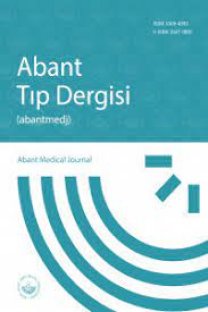Kurşun Nefropatisi: Vaka Sunumu ve Literatürün Gözden Geçirilmesi
Fanconi sendromu, Kronik böbrek hastalığı, Kurşun zehirlenmesi
Lead Nephropathy: A Case Report And Review Of The Literature
Fanconi syndrome, Chronic kidney disease, Lead poisoning,
___
- Bernard BP, Becker CE. Environmental lead exposure and the kidney. Clin Toxicol 1988;26 (1-2) :1-34.
- Goyer RA. Lead toxicity: current concerns. Environ Health Perspect 1993 Apr;100:177-87.
- Batuman V. Lead nephropathy, gout, and hypertension. Am J Med Sci 1993;305 (4) :241-7.
- Ritz E, Wiecek A, Stoeppler M. Lead nephropathy. Contrib Nephrol 1987;55:185-91.
- Cullen MR, Robins JM, Eskenazi B. Adult inorganic lead intoxication; presentation of 31 new cases and a review of recent advances in the literature. Medicine 1983;62 (4) :221–47.
- Soderland P, Lovekar S, Weiner DE, Brooks DR, Kaufman JS. Chronic kidney disease associated with environmental toxins and exposures. Adv Chronic Kidney Dis 2010;17 (3) :254-64.
- Goyer RA. Mechanisms of lead and cadmium nephrotoxicity. Toxicol Lett 1989;46 (1-3) :153-62.
- 8.Cramer K, Goyer RA, Jagenburg R, Wilson MH. Renal ultrastructure, renal function, and parameters of lead toxicity in workers with different periods of lead exposure. Br J Ind Med 1974;31 (2) :113-27.
- Odigie IP, Ladipo CO, Ettarh RR, Izegbu MC. Effect of chronic exposure to low levels of lead on renal function and renal ultrastructure in SD rats. Niger J Physiol Sci 2004;19 (1) :27–32.
- Hommond PB, Lerner SJ, Gartside PS. The relationships of biological indices lead exposure to the health status of worker in a secondary lead smelter. J Occup Med 1980;22 (7) :475–84.
- Pollock CA, Ibels LS. Lead nephropathy- preventable cause of renal failure. Int J Artif Organs 1988;11 (2) :75-8.
- Pollock CA, Ibels LS. Lead intoxication in industry. Med J Aust 1986;145 (11-12) :635-9.
- Davies JM. Long-term mortality study of chromate pigment workers who suffered lead poisoning. Br J Ind Med 1984;41 (2) :170-8.
- Wedeen RP, Maesaka JK, Weiner B, Lipat GA, Lyons MM, Vitale LF et al. Occupational lead nephropathy. Am J Med 1975;59 (5) :630-41.
- Yayın Aralığı: 6
- Başlangıç: 2012
- Yayıncı: Bolu Abant İzzet Baysal Üniversitesi Tıp Fakültesi Dekanlığı
Eklem İçi Kalkaneus Kırıklarında Cerrahi Tekniklerin karşılaştırılması
Mehmet Orçun AKKURT, Vedat BİÇİCİ, Özkan ÖZTÜRK, İsmail DEMİRKALE
Kadihan YALÇIN ŞAFAK, Güven YILMAZ
Parotis Bezi Sebasöz Lenfadenoma Olgu Sunumu
Tarık YAĞCI, Serap KOYBASİ ŞANAL, Yusuf Ozgur BİCER, Hesna Müzeyyen ASTARCI
Yasin Emre KAYA, Metin CELİK, Tolgahan KURU, Abdullah Alper ŞAHİN, Cengiz ISİK, Fuat AKPİNAR
Psöriatik artrit ve romatoid artrit: Birliktlik mi, yanlış tanı mı?
Samet Sancar KAYA, Hamit GÖKSU
Perkütan Nefrolitotomi Sonrası Nadir Bir Komplikasyon: Olgu Sunumu
Mehmet SEVİM, Serhat ÇETİN, Bekir ARAS, Şahin KABAY
Kurşun Nefropatisi: Vaka Sunumu ve Literatürün Gözden Geçirilmesi
Şimal KÖKSAL CEVHER, Ezgi ÇOŞKUN YENİGÜN, Perihan PERKİN, Fatih DEDE
Kızamık kızamıkçık kabakulak aşısı sonrası gelişen akut infantil hemorajik ödem: Bir olgu sunumu
Karpal tünel sendromunda B12 vitamin eksikliği risk faktörü olabilir mi?
Mehmet MÜHÜRDAROĞLU, Ezgi AGADAYI
Meme Kanseri Hastalarında Radyoterapi Sonuçlarımız Ve Etki Eden Faktörler
